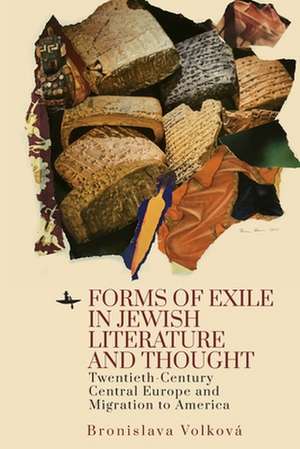Forms of Exile in Jewish Literature and Thought
Autor Bronislava Volkovaen Limba Engleză Paperback – 28 iul 2021
| Toate formatele și edițiile | Preț | Express |
|---|---|---|
| Paperback (1) | 146.40 lei 3-5 săpt. | |
| Academic Studies Press – 28 iul 2021 | 146.40 lei 3-5 săpt. | |
| Hardback (1) | 691.93 lei 6-8 săpt. | |
| Academic Studies Press – 28 iul 2021 | 691.93 lei 6-8 săpt. |
Preț: 146.40 lei
Nou
28.01€ • 29.31$ • 23.27£
Carte disponibilă
Livrare economică 12-26 martie
Specificații
ISBN-10: 1644695901
Pagini: 100
Dimensiuni: 156 x 234 mm
Greutate: 0.18 kg
Editura: Academic Studies Press
Notă biografică
Cuprins
Acknowledgements
Introduction: A General History of Concepts of Exile
1. Exile as Expulsion and Wandering: Joseph Roth, Sholem Aleichem, Stefan Zweig
2. Exile as Aesthetic Revolt and an Inward Turn: Hugo von Hofmannsthal, Robert Musil, Hermann Broch)
3. Exile as Social Renewal: Theodor Herzl, Max Nordau
4. Exile as Resistance and a Moral Stance: Karl Kraus, Arthur Schnitzler
5. Exile as Gender Marginalization and the Independence of the Femme Fatale: Alma Mahler
6. Exile as an Escape from Patriarchal Oppression: Franz Werfel
7. Exile as Anxiety and Involuntary Memory: Franz Kafka, Sigmund Freud, Marcel Proust, Bruno Schulz
8. Exile as Doom and Revenge: Hermann Ungar
9. Exile as a Loss of Identity: Saul Friedländer
10. Exile as Abandonment: Peter Weiss
11. Exile as Bearing Witness: Elie Wiesel
12. Exile as Dehumanization: Primo Levi
13. Exile as an Awakening of Consciousness: Ji¿í Weil, Ladislav Fuks, Arnot Lustig
14. Exile as a Feeling of Meaninglessness: Egon Hostovský
15. Exile as Transformation and a Will to Meaning: Viktor Frankl, Simon Wiesenthal
Conclusion
Bibliography
